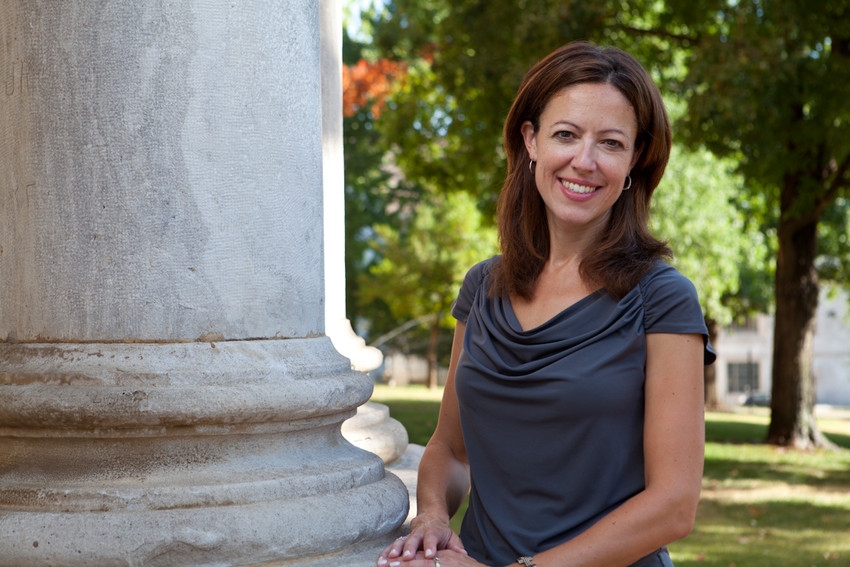Pryor Center Presents: Measuring, Comparing, and Explaining Arkansas's Partisan Earthquake
The David and Barbara Pryor Center for Arkansas Oral and Visual History in the J. William Fulbright College of Arts and Sciences continues its signature lecture series at 6 p.m. Wednesday, Oct. 24, with "Pryor Center Presents: Measuring, Comparing, and Explaining Arkansas's Partisan Earthquake," featuring the Department of Political Science's Janine A. Parry.
Although few people outside its borders knew it, Arkansas was among the most Democratic states in the country until 2010, according to Parry. The Democrats held all seven statewide executive offices and almost 75 percent of state legislative seats. About 100,000 more Democratic than Republican votes had been cast in the most recent presidential primary.
Then — in just three election cycles: 2010, 2012 and 2014 — Arkansas' political world was upended. But how does Arkansas's partisan earthquake compare to those in other states at other times? Parry, professor of political science and founder of the 20-year-old Arkansas Poll, will offer insight into measuring, comparing and explaining the state's swift transformation by considering it within a national context.
The Pryor Center is located at 1 East Center Street, Suite 120, and parking is available on the Fayetteville Square. The event is free and open to the public.
Janine A. Parry is professor of political science at the University of Arkansas and has directed the Diane D. Blair Center of Southern Politics and Society's annual Arkansas Poll since its inception in 1999. She teaches courses at the introductory through graduate level on topics including American National Government, Politics on Film, Arkansas Politics, Gender and Politics, and more, and has earned numerous teaching honors, including the Baum Award for Excellence in Teaching in 2016. From 2008-2011, she co-directed the Teaching and Faculty Support Center at the University of Arkansas, and from 2012-2014 she served as the elected chair of the Campus Faculty/Faculty Senate. As the author of two books and dozens of articles and chapters on subjects relating to state politics, public opinion, and gender and politics, she frequently provides analysis to media outlets, includingNPR, CNN, the BBC, the New York Timesand more.
About the The David and Barbara Pryor Center for Arkansas Oral and Visual History: The David and Barbara Pryor Center for Arkansas Oral and Visual History is an oral history program with the mission to document the history of Arkansas through the collection of spoken memories and visual records, preserve the collection in perpetuity, and connect Arkansans and the world to the collection through the Internet, TV broadcasts, educational programs, and other means. The Pryor Center records audio and video interviews about Arkansas history and culture, collects other organizations' recordings, organizes these recordings into an archive, and provides public access to the archive, primarily through the website at http://pryorcenter.uark.edu. The Pryor Center is the state's only oral and visual history program with a statewide, seventy-five county mission to collect, preserve, and share audio and moving image recordings of Arkansas history.
About the J. William Fulbright College of Arts and Sciences: The J. William Fulbright College of Arts and Sciences is the largest and most academically diverse unit on campus with three schools, 16 departments and 43 academic programs and research centers. The college provides the core curriculum for all University of Arkansas students and is named for J. William Fulbright, former university president and longtime U.S. senator.
About the University of Arkansas: The University of Arkansas provides an internationally competitive education for undergraduate and graduate students in more than 200 academic programs. The university contributes new knowledge, economic development, basic and applied research, and creative activity while also providing service to academic and professional disciplines. The Carnegie Foundation classifies the University of Arkansas among only 2 percent of universities in America that have the highest level of research activity. U.S. News & World Reportranks the University of Arkansas among its top American public research universities. Founded in 1871, the University of Arkansas comprises 10 colleges and schools and maintains a low student-to-faculty ratio that promotes personal attention and close mentoring.
Topics
Contacts
William A. Schwab, director of education, research, and outreach
Pryor Center for Arkansas Oral and Visual History
479-575-8151,
bschwab@uark.edu
Andra Parrish Liwag, director of communications
J. William Fulbright College of Arts and Sciences
479-575-4393,
liwag@uark.edu
Headlines
U of A's Inspirational Chorale Makes Its Carnegie Hall Debut
The U of A's Inspirational Chorale took center stage at Carnegie Hall in March, performing under the direction of professor Jeffrey Murdock to a packed audience at the iconic Stern Auditorium.
The State of Economics With Mervin Jebaraj Set for June 5
U of A economist Mervin Jebaraj will analyze state's economic trends and regional issues in an upcoming talk. Preregistration is required by May 31.
Faculty Demonstrate Dedication to Student Success Through Teaching Credentials
Eight faculty members from across the U of A have earned the prestigious Association of College and University Educators certification in Effective College Teaching.
Artificial Intelligence, Machine Learning Boost Arkansas Animal Science Research
Aranyak Goswami, a bioinformatics specialist, will work with three different departments to boost the research arm of the U of A System Division of Agriculture.
College of Education and Health Professions Doctoral Student Picked for Grosvenor Fellowship
Jessica Culver, a doctoral student in the College of Education and Health Professions Adult and Lifelong Learning program, has been selected as a member of the 2024 Grosvenor Teacher Fellowship.





